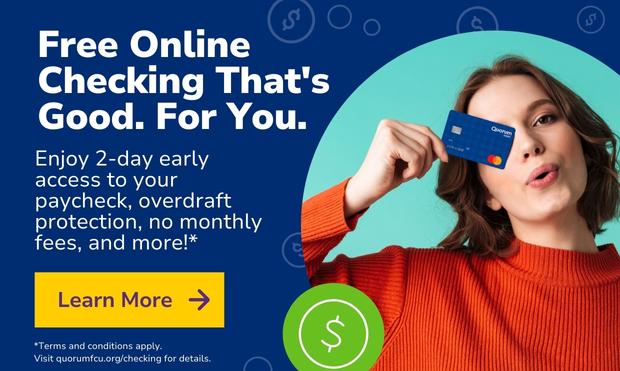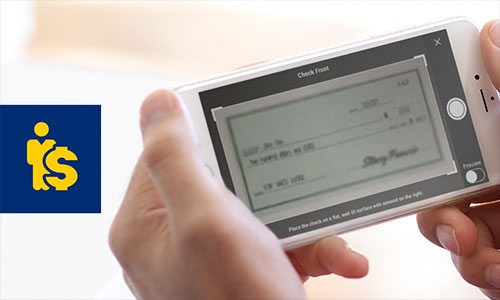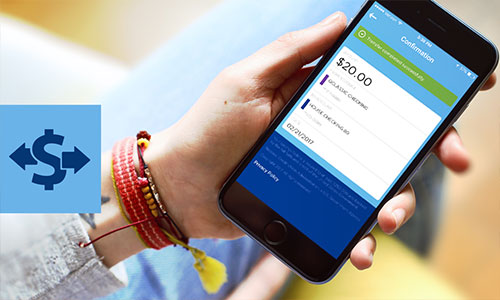Young people today are all about the apps, especially when it comes to their money.
For instance, you go out to dinner with friends: One friend picks up the tab, and you and your group pull out your phones to send your share to the bill-payer instantly through an app. It’s fast, convenient, and doesn’t require you to ask the bartender to convert your $20 bill into smaller increments.
The use of digital wallets—also called virtual wallets—continues to grow, allowing consumers a place to store payment information and passwords from a variety of accounts. With all of these financial apps and digital tools available, are young people foregoing the traditional checking account? …No!
That said, customers aren’t using their checking accounts the way their elders did. They aren’t writing checks for every purchase; instead, they are using their checking accounts in combination with online and mobile banking to optimize those accounts.
The First Benefit of a Checking Account
A checking account remains the most convenient way to deposit your money and pay your bills. Digital wallets are geared more toward buying items. And savings accounts sometimes have withdrawal limitations (Note: Regulation D has currently been suspended, so limitations no longer apply). Your employer still needs an account in which to transfer your direct deposit, and that’s easiest through a checking account. Even if you’re a member of the gig economy and an employer sends you money via services like Venmo or PayPal or Zelle®, you must have a way to access your money.
The people you pay—your utility companies, the dry cleaner or the financial institution that holds your mortgage—don’t always accept payments by P2P apps, so transferring those payments to a traditional checking account is an easy and convenient option.
If you’re from the millennial generation or later, you might think you’ll never write a check from your checking account—that’s only something Grandma does when she sends you a birthday check each year, right?—but it simply isn’t true. While a Gen Xer or a millennial might not write a paper check as often as a baby boomer does, checking accounts remain the most common type of account.
Your Checking Account as a Budgeting Tool
You know that ledger that comes with your checkbook? While you may not use it to balance your checkbook each month, there’s something to be said for tracking each transaction you make: You enter your withdrawals, whether they’re by check, at the ATM or with your debit card, and also record your deposits, giving you a clear picture of your financial status, minute by minute. Your financial institution more than likely offers online banking or a mobile banking app you can use in addition to your ledger book, just in case you forgot to write down an ATM withdrawal.
Checking accounts also offer the advantage of online bill payment: Fixed amounts, such as your mortgage or student loan payment, can be scheduled on a certain date, and you can write them in your checkbook as you record your deposit from your paycheck. (With Quorum’s online bill pay service, you can pay your bills electronically or, for service providers that only accept checks, Quorum will send checks in the mail on your behalf!)
As an example, say you are paid on the first and the fifteenth of each month, and you pay certain bills out of the first deposit of the month and others from the second deposit. As you record your direct deposit, immediately deduct those fixed payments (either in your ledger, or in a budgeting app). That will let you know how much you have to spend for groceries, personal care and the occasional night out.
Relationship Banking
Your banking needs might be simple today, but they’ll likely grow as you advance in your career and earn more income. You may want to consider credit cards that offer rewards, a first or second mortgage, or high-yield savings accounts to save money for your children’s college funds.
If you have an existing relationship with a financial institution through your checking account and meet some of its qualifications, you may see some perks: That could mean higher interest rates on deposits or better rewards on your checking account or credit cards. Check to see if your financial institution offers benefits when you set up services like direct deposit (Quorum, for instance, has a QClassic basic checking account, but also offers a QChoice checking account that earns dividends and reimburses up to $15/month in ATM fee for members who opt in for eStatements and have a minimum monthly direct deposit(s) totaling $1,000 or minimum average daily balance of $5,000).
Not everything these days can be done through an app. And with something as important as your hard-earned money involved, a checking account can be the foundation for your financial future.









Comments Section
Please note: Comments are not monitored for member servicing inquiries and will not be published. If you have a question or comment about a Quorum product or account, please visit quorumfcu.org to submit a query with our Member Service Team. Thank you.